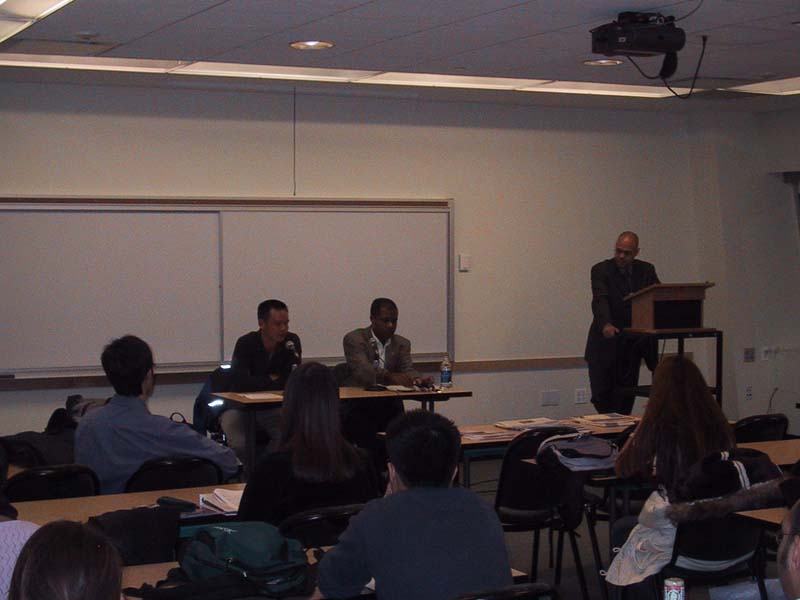[8]
AL BERRIOS & CO. EVENT
***********************************
al berrios & co. Executive Panel Series featuring Deroy Murdock,
syndicated columnist for the Scripps Howard New Service and Edward Wong, reporter
for the New York Times: "Journalism Today: Writing Strategies for Journalism"
By Al Berrios
 |
Inform vs. persuade. The facts vs. opinions. These are the weapons of journalists. And although it's been said that sometimes there's no difference in today's journalism, the fundamental truth was best said by Deroy Murdock's quote by Mark Twain: "If you don't read a newspaper, you are uninformed; if you do read a newspaper, you are misinformed."
The most resounding point both our speakers, Deroy Murdock, syndicated columnist for the Scripps Howard New Service and Edward Wong, reporter for the New York Times, agreed upon was that in order to become a successful journalist, you need to know how to tell a story or narrative. Imagery, metaphors, human dramas, and anecdotes are crucial to engage readers in and communicate complex ideas. For example, when discussing health care, pick a specific person or family and what they're going through, before discussing the issue. Once you do this, stick to it. Although you're free to explore multiple points of view as a reporter, as an opinion writer, it's important to stick to your views. Any alteration in your argument presents a break in the standard you've set, and ultimately, a loss of authority for your argument. Do these things, and you are a great writer. But most importantly, do them, and like our magazine publishers said the week prior ("The Business of Magazine Publishing"), and you will "engage, entertain, and enlighten".
This brought up the subject of creativity - how important is it in journalism? Not very if you're reporting the facts, which is why the narrative is so important. But when writing opinion articles, coming up with creative analogies helps.
It takes practice, though. Both our journalists, excellent writers, have spent years traveling and getting advanced degrees at prestigious universities before they decided they wanted to earn their living communicating in print. And even then, they had to prove themselves with letters to the editor and working at small community papers before working the "big leagues". But the key is to understand your goal. For Mr. Murdock, it's about doing his part to help change the world. For Mr. Wong, it was about the access, discovering something new unimpeded.
Ultimately, it's about "perseverance". The problem is, in your perseverance, it is easy to lose track of your own ethics. Between the time a journalists makes that decision to become one and by the time they're successful at it, many obstacles can derail your credibility with your peers, potential interviewees, but most importantly, your readers.
Overall, this panel, hosted on Thursday, October 30th, 2003, part of our executive panel series, ranked third this Fall. Although the individual speakers were ranked almost identically, and better than other speakers since the Summer, only 79% of attendees learned totally new things, 18% learned something new, and 3% didn't learn anything at all.
RELATED
AL BERRIOS & CO. ARTICLES
> Analysis of News Media
Disclaimer:
The recommendations, commentary and opinions published herein are based on public
information sometimes referenced via hyperlinks. Any similarities or likeness
to any ideas or commentary from any other sources not referenced is purely coincidental.
al berrios & co. cannot control any results occurring from advice obtained
from this publication nor any opinion(s) conveyed by any reader of this publication.
(c) 2001-2005. All Rights Reserved. al berrios & company, inc. Published
by al berrios & co. This Report may not be reproduced or redistributed in
any form without written permission from al berrios & co., subject to penalty.